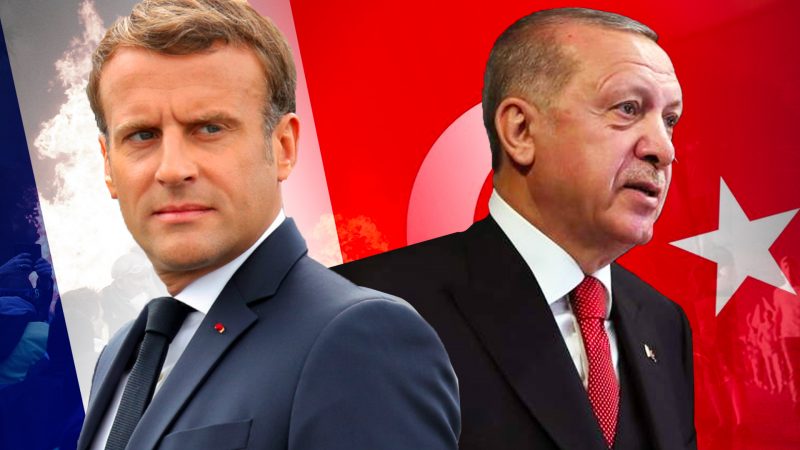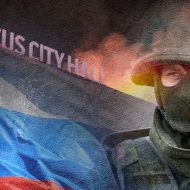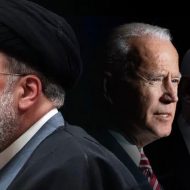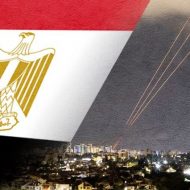On November 25, the French Senate will discuss a resolution to recognize the statehood of the so-called “Republic of Artsakh” – the separatist Armenian authorities of Nagorno-Karabakh. The resolution was initiated by Senator Bruno Retailleau, Chairman of the opposition faction of the “Republicans” party in the Senate.
After Armenia lost the war for Nagorno-Karabakh, this move seems quite extravagant. Yerevan itself did not officially recognize the formation of Armenian separatists as a state, although it supported them. Now that Armenian troops are to leave the occupied territories and Russian and Turkish troops are to appear in Nagorno-Karabakh, there is no reason at all to recognize ‘Artsakh’.
Yet, the French elites see the situation differently. Contrary to popular belief, Paris’ pro-Armenian policy is not only about the influence of the Armenian lobby. France views the Nagorno-Karabakh issue not in the context of Azerbaijan’s struggle to restore its territorial integrity, but in the context of its own large-scale geopolitical confrontation with Turkey.
Anti-Turkish consensus
It is indicative that when announcing its resolution, Bruno Retailleau did not say a word about Azerbaijan. On the other hand, he stressed the danger of “Turkish Islamist expansionism”. Voting in the French Senate may not lead to the recognition of “Artsakh” by the French Republic, but the very discussion of this topic will certainly lead to a rise in anti-Turkish sentiment in French society.
It is important that similar views are not only held by the right-wing “Republicans” and the deputies from the former “National Front”… Thus, one of the architects of French Middle Eastern politics, the liberal “philosopher” Bernard-Henri Levy, who traditionally expresses the views of the French establishment, called on France in Le Point to “recognize the Nagorno-Karabakh Republic”.
Bernard-Henri Levy makes no secret of the fact that he believes France should “protect” the Armenians “against Erdogan and Putin” by establishing a stronghold in the South Caucasus.
It is indicative that no serious politician has supported Turkey and Azerbaijan in the Nagorno-Karabakh issue. The same can be said of the other problems that have led France and Turkey to separate sides of the barricades. Even such Macron critic as Marine Le Pen stated back in September that Macron she was “strongly backing President Emmanuel Macron” in his confrontation with Turkish President Recep Tayyip Erdogan. Another critic, the left-wing Jean-Luc Mélenchon, has called Turkey an “Islamist dictatorship” and criticizes Macron for his alleged softness towards Ankara
From Greek provocations to sanctions
A new wave of escalation in French-Turkish relations took place in October and early November when Paris described a number of Erdogan’s statements as alleged “declarations of violence”, condemning them. France then threatened with sanctions against Turkey amid growing tensions between the two countries.
French Foreign Minister Jean-Yves Le Drian told Radio Europe 1 the following:
“There are now declarations of violence, even hatred, which are regularly posted by President Erdogan which are unacceptable.”
He added that the European Council had already decided to take action against the Turkish authorities, and it was now important for the Turks to take the necessary measures to avoid this.
“There is a meeting in Brussels in December. The 27 [member-states] had decided that, if Turkey did not change its position, action would be taken, including possible sanctions, and all options are on the table,” he told lawmakers, after describing Ankara’s behaviour as “bellicose and unbearable.”
Le Drian has obviously hinted at the forthcoming EU summit on 10-11 December 2020, where he will try to move this agenda forward.
The forthcoming anti-Turkish agenda was also hinted at by Federal Minister for Foreign Affairs Heiko Maas, who demanded that Turkey “stop provocations” in the Eastern Mediterranean if it wants to avoid new discussions about EU sanctions against Ankara at the EU summit in December. “It is up to Turkey what decision will be taken at the EU summit in December,” Mr Maas said, before a meeting with his EU counterparts.
The EU, led by France, also discussed other pressure measures in October – the “Turkish arms embargo” – after France, Greece and Cyprus announced so-called “provocative” actions by Ankara in the Eastern Mediterranean. In October, Greek Prime Minister Kyriakos Mitsotakis called on the European Union on Wednesday to reconsider its customs union with Turkey in response to Ankara’s ongoing gas exploration in the Mediterranean, regretting what she called Turkey’s “imperial fantasies”.
Not all countries are so engaged in an anti-Turkish way: for example, Germany, Spain, Italy, Hungary and Malta, for pragmatic reasons, then blocked the proposal.
Escalation chain
The last chain of events and statements that increased the controversy between France and Turkey can be described in the following order:
– The murder of a French teacher who showed a caricature of the Prophet Mohammed during school hours, which triggered a whole surge of openly anti-Muslim measures under the guise of “the fight against terrorism” (which Paris has been unsuccessfully fighting against since the waves of terrorist attacks in 2015).
– Macron translated the problem exclusively into the “Islamic factor” and refused to condemn the very root of the problem – the cartoon’s hateful anti-Muslim attitude. He said that Islam is “in crisis” and the main problem is “Islamist separatism”, and recalled his commitment to the secular path.
– Macron began to consistently implement a series of tough measures against Islam as a whole, closing a number of Muslim organisations, businesses and even cafes within the country. One such organization was the largest French Muslim BarakaCity, which was dissolved, prompting its founder to seek asylum in Turkey.
– Erdogan replied that Macron was suffering from mental health problems, which led France to withdraw its ambassador from Turkey. Erdogan also called for a boycott of French products, accusing Macron of Islamophobia, which was supported by many Islamic countries and leaders.
The geopolitics of the conflict
This is not the first time that the leaders of Turkey and France have had an altercation. A year ago, when Macron uttered his famous phrase about the “brain-death of NATO”, Erdogan advised the French leader to check his own brain. At that time, Macron’s statement was linked, among other things, to NATO’s inability to resolve the Franco-Turkish conflict.
A year later, these contradictions have not disappeared. On the contrary, the conflicting nature of relations between the two countries, where there are no specific points of contact and there are more and more acute angles, is becoming a new norm in international relations. Turkey has received a long-term geopolitical adversary from France, Macron. What are the reasons for this?
First of all, they lie on the geopolitical plane. Let’s take a look at the main reasons.
1. Syria. France has been actively assisting the Kurdish separatist terrorist groups (YPG-PKK) fighting against Turkey since Emmanuel Macron came to power. The separatists have also previously enjoyed support from Paris. Under Macron, however, reports of the presence of French troops in areas controlled by terrorists leaked to the world’s media. In addition, the French, along with the Americans, diplomatically participated in attempts to unite other Kurdish groups in Syria around the PKK. Turkish operations against Kurdish separatists have traditionally strained relations between Ankara and Paris.
2. Libya. The “Libyan issue” in the French government was quite closely dealt with by Le Drian, the current French Foreign Minister, and under Hollande, the Minister of Defence. He is closely linked to Khalifa Haftar through advisor Michel Scarbonchi, former MEP, Middle East and North Africa specialist. France, under Macron, has placed a heavy reliance on the Khalifa Haftar as opposed to the Government of National Accord (GNA), which is supported by Turkey. Until 2011, negotiations and contacts with the Haftar forces were carried out by France primarily through the Directorate General of External Security. Since 2015, Paris has been working to create a positive image of Haftar in the press and Haftar’s vivid statements that he intends to fight terrorists have provided a good basis for this. Paris later declassified its support for Haftar in 2016. In July 2017 Macron tried to take on the role of a conditional “peacekeeper” between the Libyan parties by inviting both Haftar and al-Sarraj to talks, but then between 2017 and 2018 Paris provided military support to Eastern Libya by supporting the Haftar offensive.
“I understood that the key to future Libya was him. When you know geopolitics you immediately understand where the strong man is. Al-Sarraj is a puppet in the hands of the UN and Islamist militias. Haftar was fighting him against the jihadists”, Scarbonchi commented.
At the same time, Paris is trying to draw to its side at least one senior GNA figure, Fathi Bashagha, who has already made two visits to France over the past year.
In addition to the political interests mentioned above, France has one fundamental economic interest in Libya: the activities of the energy company Total. For France, Libya is one of the most important countries and areas of influence in North Africa, including for simplified oil production. Macron’s government has signed contracts for Total, which significantly increased its presence on the Libyan energy market, purchasing a 16.3% stake in the Libyan Waha oil field from the US company Marathon Oil for $450 million.
The Company has been present in Libya since 1954. In 2018, the Group’s domestic production averaged 63,000 barrels of oil equivalent per day from the Al Jurf offshore field (37.5%), El Sharara land zone (15% on former Block NC 115 and 12% on former Block NC 186) and Waha land concessions (16.33%).
3. The Eastern Mediterranean. Turkey, in line with the Mavi Vatan (“Blue Homeland”) doctrine, is seeking to expand its influence in the Mediterranean. According to a formal agreement that it signed with the Government of National Accord (GNA) of Libya in November 2019, it claims certain areas that Greece considers its own. Paris supports Greece. Turkey, however, intends to carry out exploration in these areas. The area of the Eastern Mediterranean is considered to be rich in hydrocarbons.
Paris also supports Southern Cyprus in the exploitation of already explored deposits on the Cyprus shelf. The French oil and gas giant Total, together with the Italian company ENI and the American company Exxon, are operating Cypriot fields. Turkish demands for fair redistribution of resources in view of the island’s Turkish community (the Turkish Republic of Northern Cyprus) are not taken into account by France. Turkey’s actions to protect the rights of Turkish Cypriots are considered hostile by Paris. They are the ones that France, together with Greece and South Cyprus, refer to when proposing sanctions against Turkey.
4. Closely related to the geopolitics of the Eastern Mediterranean are the contradictions in the energy sector.
In January 2020, France was asked to join the Eastern Mediterranean Gas Forum (other members include Cyprus, Egypt, Israel, Greece, Italy and Jordan and the United States (as a permanent observer). (https://www.reuters.com/article/us-egypt-gas-idUSKBN1ZF1V2). The aim of the association is to bring gas from Israel and South Cyprus to Europe. This is an undesirable project for Turkey, as the interests of TRSK are not taken into account, and the gas itself bypasses Turkey, which claims to be the main gas hub in the region after the construction of Turkish Stream.
5. Africa.
A separate competition region is Africa, which has been considered the “backyard” of France since the days of colonialism and which, as part of the Francafrique trend, continues to make every effort to maintain military, economic and political influence in the region.
Meanwhile, Turkey is taking gradual steps towards successful cooperation with the continent: the African Union granted Turkey observer status in 2005, and the year was declared by the Turkish government as the “Year of Africa”. Turkish-African relations began to develop strongly in 2013 and have since shifted significantly since Turkey was declared a strategic partner of the continent by the African Union in January 2008, which could not help but cause discontent in Paris.
Such measures are not only related to mutually beneficial cooperation: the re-emergence of the crisis in Libya is forcing Turkey to transform its soft power into an influence on politics and security in the region – and West Africa is the key to this approach. Military cooperation and a possible military base contribute to the expansion of Turkey’s sphere of influence in Libya and provide a buffer against the potential Egyptian threat of Turkey in Libya.
Today, cooperation is manifested in various areas: These are, of course, Turkey’s major financial investments in African countries, the establishment of diplomatic contacts (only in September is the visit of the Minister for Foreign Affairs of Turkey to several countries – Mali, Guinea-Bissau and Senegal) and embassies and humanitarian aid, security cooperation and active participation in peacekeeping missions in Africa (sending forces to 7 of the 9 countries where Ankara is involved in peacekeeping activities – MONUSCO/DRC, MINUSMA/Mali, MINUSCA/CAR, UNAMID/Darfur, UNMISS/South Sudan, UNOCI/Cote d’Ivoire and UNMIL/Liberia), cooperation in the field of health and tourism, and in general participation in African Union projects.
However, France under Macron is also trying to maintain and even increase its influence on the African continent.
During his presidency, Macron has visited Algeria, Burkina Faso, Chad, Ghana, Kenya, Nigeria, Senegal, twice Mali, Côte d’Ivoire, Mali, Morocco, Mauritania, Niger, Djibouti and Tunisia. The list is quite long – and this does not include visits by French ministers and other officials.
Macron is trying to intervene in Africa’s affairs using military methods: for example, Operation Barkhane continues, which involves at least 5,000 soldiers in the countries of the Sahel (only officially in Chad, Niger, Mauritania and Burkina Faso).
This is on top of regular political interference and an attempt to influence domestic elections in Africa. A fresh illustration of Macron’s intervention which has caused serious resentment is the situation in Côte d’Ivoire, where Macron was accused of interfering in politics in the run-up to Saturday’s elections in which Alassane Ouattara is seeking a controversial third term.
“Turkey, as a newcomer, an emerging power, their interests, and presence is threatening French interests and vice versa,” said Caliskan. “Turkey is trying to secure the region around Libya. We saw Erdogan’s visit to Niger and Turkey recently engaging with Mali.”
Earlier this year, Turkey signed a defense agreement with Niger. The Turkish military already has a presence in Libya. For now, analysts say Ankara’s priority is to build a strategic presence in the region. But Turkish companies are also eyeing African markets currently dominated by French firms, which analysts say can only add to the deepening rivalry between Turkey and France.
The confrontation between Ankara and Paris is based on geopolitical factors. Turkey is challenging the established world order of Eurocentrism and Western hegemony. Emmanuel Macron and the elites in France are seeking to maintain this order and even make up for the loss of the US position as the center of the West by increasing European influence, whether it be through new operations in Africa or Macron’s attempts to play the role of patron of Lebanon after the Beirut port explosion.
The confrontation between France and Turkey is not about Islam and the “Christian world” (Macron’s France is not a Christian country at all). Neither is it about the confrontation between “secularism” and “Islam”… On the one hand, Turkey, since the days of Ataturk, is also a country with strong traditions of secularism. However, Turkish Kemalists will not be able to defend the kind of mockery of religion that is allowed in France.
On the other hand, it is telling that Turkey, a country with a secular constitution, freedom of religion, etc., has opposed Macron. Saudi Arabia, on the other hand, unexpectedly supported Macron’s campaign against ‘radical Islam’. For many years, Saudi Arabia and other Gulf countries have been the source of the most radical and irreconcilable current in Islam – Salafism.
It is worth paying attention to France’s links with the UAE and Saudi Arabia. For example, in 2018, Crown Prince Mohammed Ibn Salman paid a three-day visit to France when Macron said that despite continuing disagreements with Riyadh over the 2015 agreement, his government agreed with Saudi Arabia on the need to curb Iranian ‘expansionism’, although he argued that the global nuclear treaty with Tehran should be preserved.
The rhetoric was then only softened: in 2019, Macron insisted that France sell arms to Saudi Arabia and the United Arab Emirates.
“Saudi Arabia and the United Arab Emirates are allies of France and allies in the fight against terrorism. We accept responsibility for that,” he said.
“We need to be with our allies in these difficult times and the war against terrorism is a priority for us,” he added.
Curiously, against the backdrop of the recent scandal with the beheaded teacher in France and the anti-Muslim measures that followed, Emmanuel Macron received support from Saudi Arabia in his fight against Islamism.
“The structuring of the hajj pilgrimage will provide the necessary funding [for the training of imams in France]. We have conducted large-scale work with Saudi Arabia to regulate it,” he said in October in Les Mureaux (Yvelines) on Friday. This sentence being scattered in the middle of the speech against “Islamist separatism” is the result of secret discussions conducted for three years.
The UAE has also supported Macron in the face of growing anger in the Middle East over France’s approach to Islam. Moreover, the UAE has even gone as far as to blame Turkey for the situation. The UAE Minister of State for Foreign Affairs Anwar Gargash accused Turkish President Recep Tayyip Erdogan of fanning the flames of religious discord amidst terrorist attacks.
“Erdogan is trying to hijack the hearts and minds of Muslims all over the world and use them as tools to serve his political agenda – he is using Islam as an ideology, not as a religion,” said Ali al-Nuaimi, a member of the UAE’s advisory Federal National Council.
Thus, we can say that in the fight against Turkey Macron has secured the support of other Islamic players – the Gulf States.
Thus, for the sake of solving its geopolitical problems, including the confrontation with Turkey, Macron’s France is ready to make an alliance with Saudi Arabia and the UAE, although all these countries are Islamic and support radical forms of Islam themselves.
All the same, if France were headed by another politician rather than Macron, relations would hardly be less conflictual. After all, this would not change the interests of the French political and economic elites in Francafrique and the Eastern Mediterranean. Also, all the French political forces are in favour of Kurdish terrorists in Syria, which does not give any hope of changing Paris’ policy on this issue. Nagorno-Karabakh is now another point where France is firmly opposing Turkey.
However, there is an ideological factor in the confrontation between Turkey and France. Macron is ideologically globalist and liberal, but the current Turkish leadership is not. It protects the sovereignty of the country and the traditional values of the Turkish people. This introduces a new element that exacerbates French-Turkish relations. For Macron, the strengthening of sovereignty that Erdogan is dealing with in Turkey is an attack on liberal values, and the Turkish leader himself is an “open society enemy” with whom it is impossible to negotiate on equal terms.
With an equally liberal democratic administration coming to power in the United States, which also has a negative attitude towards Turkey, it is to be expected that Paris, together with the United States, will increase pressure on Turkey on the grounds that it is defending democratic values.
On the other hand, the personal factor, Macron’s attempts to use Islam as a “scapegoat” for his own sins, also works to strengthen objective French-Turkish differences.
On Wednesday he gave the French Council of the Muslim Faith (CFCM) a 15-day ultimatum “charter of republican values”.
Macron’s duality
France, under the guise of protecting its own interests, is discrediting the image of Turkey and Erdogan personally on the international stage. The best way to eliminate a competitor is to sabotage international structures and put them in isolation and under sanction, as has already been practiced in Cuba, Venezuela, Russia, partly China and DPRK. It is therefore to be expected that Paris will launch various sanctions initiatives on various occasions against Turkey.
Macron covers its own internal failures with attacks on Islam (although the real problem that a serious leader would address is the fragmentation of society, the poor population and the fruits of his “Welcome Migrants” policies).
Some analysts call the mixture of atheism and fundamentalism in Europe “secular extremism”, the embodiment of which is Macron. In fact, by encouraging Charlie Hebdo’s actions, the Macron only provides fertile ground for sharp reactions and, most importantly, does not solve the problem of terrorism.
As an illustration of his “success” in the fight against international terrorism, this is France’s fresh statement on the reduction of its military presence in the Sahel. Less than a year after sending hundreds of additional troops to the Sahel, France hopes to reduce its military presence in the turbulent region. In practice, Paris’ activities mean the failure of French neocolonial policy in the region.
Macron is not a new Napoleon, but a symptom of the agony of French neocolonialist politics.
Macron’s approach to the problems of both internal and external terrorism are not solving the problem, and only aggravates and gives birth to new opponents of the Elysian Palace around the world.
It is curious, as the Middle East Monitor notes, that despite his declared tolerance, racism is flourishing in France, and in order to achieve a delicate balance, Macron has chosen the most politically convenient option: to target the most marginalized and impoverished French Arab and African communities in the name of fighting for the “values” of the republic against “Islamic terrorism” and the dark forces hiding inside his country.
Of course, terrorism in France itself remains a serious problem that deserves attention and counteraction. But if you listen to mainstream media and French politicians, the French government is supposedly on a kind of crusade against its own Muslim population… in a “secular” country. It seems that Macron himself is conducting a populist march against Islam and Muslims in France and other countries, the publication writes.
The next EU summit will be held in December, where leaders will be able to impose possible sanctions against Ankara. This will show whether Europe really cares about its own health and safety, or prefers to make an image of the enemy from uncomfortable third countries.









Leave a Reply